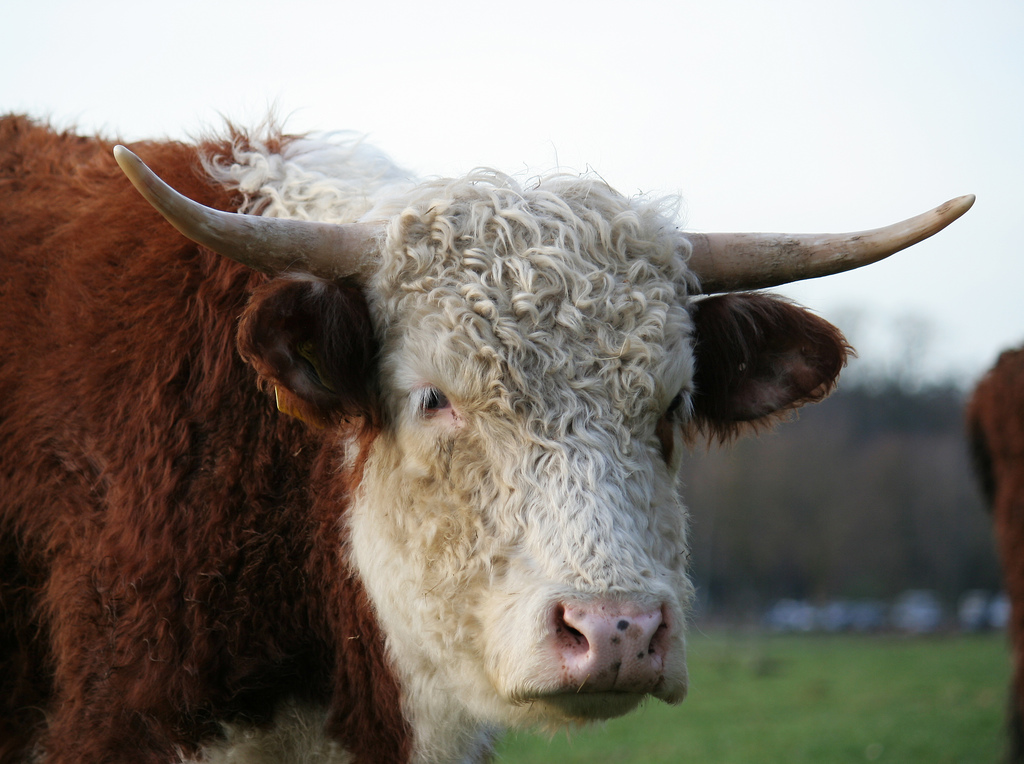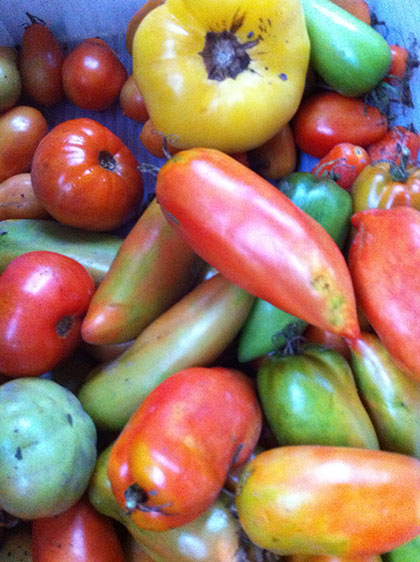Cool down with vegetables?

Hereford. Photo: Jaydot, some rights reserved.
If everyone was a vegetarian, would it reduce global warming and slow down climate change? This question is addressed in a recent article from Slate reproduced in Mother Jones summarizing research from a study done in 2009 by the Netherlands Environment Assessment Agency. The study is a widely accepted source for considering the impact of replacing meat with vegetables in the human diet.
Here’s the thumbnail summary:
The researchers predicted that universal veganism would reduce agriculture-related carbon emissions by 17 percent, methane emissions by 24 percent, and nitrous oxide emissions by 21 percent by 2050. Universal vegetarianism would result in similarly impressive reductions in greenhouse gas emissions. What’s more, the Dutch researchers found that worldwide vegetarianism or veganism would achieve these gains at a much lower cost than a purely energy-focused intervention involving carbon taxes and renewable energy technology. The upshot: Universal eschewal of meat wouldn’t single-handedly stave off global warming, but it would go a long way toward mitigating climate change. (Mother Jones)
Of course, nothing is ever that simple. Assuming you could convince every human being to eschew all meat, there are major economic impacts, and very likely the poorest people on the planet would suffer the most.
According to “Livestock’s Long Shadow,” the influential 2006 U.N. report about meat’s devastating environmental effects, livestock production accounts for 1.4 percent of the world’s total GDP. The production and sale of animal products account for 1.3 billion people’s jobs, and 987 million of those people are poor. If demand for meat were to disappear overnight, those people’s livelihoods would disappear, and they would have to find new ways of making money. (Mother Jones)
Farmers growing large commodity crops would be in the best position to transition to the new non-meat economy.
A positive impact of the switch to a vegetable-based diet would be the elimination of the use of antibiotics and growth hormones in agriculture–problematic additives used primarily in the raising of livestock.
The article’s conclusion is middle of the road and sensible.
Let’s try a middle path. We’re not all going to become vegetarians, but most of us can stop giving our money to factory farms—the biggest and worst offenders, from a pollution and public health perspective. We can eat less meat than we currently do, especially meat from methane-releasing ruminants (cattle, sheep, goats, etc.). Just because a sudden global conversion to vegetarianism would have jarring effects doesn’t mean we can’t gradually reduce our consumption of meat, giving the market time to adjust. We not only can; we must. After all, with the world’s population slated to grow to 9 billion by 2050, we’ll be needing to take some of the 25 percent of the world’s land area back from the cows. (Mother Jones)
By the way, World Watch reported on another study that questioned the figures from “Livestock’s Long Shadow,” claiming that the 2006 report underestimated the negative climatic impact from meat production world wide.
All this seemed pretty timely as I heard a report on a just-released film, Farmland, which provides a more sympathetic than usual treatment of large farming–a film funded by big ag. Most of the films released in recent years, e.g., King Corn, Fast Food Nation, and others exploring large-scale agriculture, have been decidedly unfriendly toward agri-business. I’m curious to see Farmland. Individual farmers are really not the problem, per se. The problem is the over-industrialization of agriculture to the point that it has such a huge impact–to the tune of releasing into the environment as much as 25% of the materials that are directly causing climate change.
My mother used to say, “all things in moderation.” Perhaps some kind of reasonable, if not absolute, reduction in individual meat consumption makes the most sense, much as Michael Pollan recommended: “Eat food. Not too much. Mostly plants.”
One thing seems clear to me: magical thinking about the impact of agriculture on our environment and economy will get us into big trouble. Regardless of the whole spectrum of popular opinions on agriculture, we can no longer ignore the huge impact humans are having on our planet in the process of feeding ourselves. We need to explore more ideas and invest in more rigorous study of how we can reconfigure our methods for producing and distributing food across the planet.
Tags: agriculture, climate change, global warming, veganism, vegetarianism









Leaving aside the impact on climate change ( which I realize is the point of the article 🙂 ), a study a few years ago about sustainability on NY farms concluded that incorporating livestock into a farm made better use of the land than farms which had only crops. Farmers can graze animals on land that is marginal for farming, converting forage into useful agricultural products. I can’t seem to find the link for that study right now, but it was thought provoking.
If we stop eating ruminants, there will still be lots of dairy ruminants producing methane. All mammals produce milk, so we could switch to ‘low-emission’ ruminants such as kangaroos and wallabees or non-ruminant herbivores such as horses. If we also eliminate dairy products, we will need to rebalance our agriculture toward legumes over grains. None of this is impossible, but the clamor from agribusinesses and other interests may deafen us to the real problems.
Let us not forget we are humans because we are predators and predators are predators because they eat meat.
For the most part, the smartest animals on the planet are predators because it takes more intelligence to be a predator than it does to be a vegetarian.
Don’t get me wrong, I like my fruits, vegetables and grains. But I also like meat and fish.
Technically, we are omnivores but any true omnivore will always go for the meat when given the chance.
I believe this may be the study Ellen B. is referring to. Seems like it may have been posted on one of the blogs here at one point.
“Diet for small planet may be most efficient if it includes dairy and a little meat, Cornell researchers report”
http://www.news.cornell.edu/stories/2007/10/diet-little-meat-more-efficient-many-vegetarian-diets
The takeaway for me–at least informally–is that reducing industrially raised large animals would help. All meat-eating doesn’t have to be eliminated. Not by a long shot. More diversified farming, as Ellen B. suggested, makes good sense. If you’ve lived on a farm, animals and plants and people can integrate rather elegantly (assuming you’re not opposed to raising animals for meat). The bigger challenge is making modestly-sized diversified farming work on a scale large enough to feed millions of people in cities. By the way, I’m a vegetarian and I’ve lived on a farm that raises animals for meat. Humaneness is the bottom line for me, particularly in the slaughtering process. But that’s another conversation…
Yes, Knucklehead, that was the article. Thanks for finding it.